- Home
- Patricia McCormick
My Brother's Keeper
My Brother's Keeper Read online
If you purchased this book without a cover, you should be aware that this book is stolen property. It was reported as “unsold and destroyed” to the publisher, and neither the author nor the publisher has received any payment for this “stripped” book.
Text © 2005 by Patricia McCormick
All rights reserved. No part of this book may be reproduced or transmitted in any form or by any means, electronic or mechanical, including photocopying, recording, or by any information storage and retrieval system, without written permission from the publisher. For information address Hyperion Books for Children, 114 Fifth Avenue, New York, NY 10011-5690.
Printed in the United.States of America
First Hyperion Paperbacks edition, 2006.
3 5 7 9 10 8 6 4 2
eISBN: 978-0-7868-5174-4
ISBN 0-7868-5174-0 (pbk.)
Library of Congress Cataloging-in-Publication Data on file.
Visit www.hyperionteens.com
For Matt
Contents
Title Page
Copyright Page
The Beginning
Acknowledgments
Nurse Wesley’s standing in the front of the room acting like it’s perfectly normal to have words like puberty and hormones and safe sex on the blackboard. The other guys in my class are calling out words for certain body parts—partly to see if they count and partly because Nurse Wesley’s chest shakes when she writes on the board. Nurse Breastly, they call her. Meanwhile, I’m taking inventory of the number of hairs on the back of Paul Badowski’s neck, who I purposely sat behind because he has the most enormous head in the class, and wondering if it’s scientifically possible for a person to die of embarrassment.
It’s Human Sexuality class, which of all the cruel and unusual things they do to kids in high school has to be the cruelest. And, according to my brother Jake, who went through this last year, the worst is yet to come, when Nurse Wesley brings in an actual real-life condom and shows us how to use it by putting it on a banana. When I heard that, I told my mother I planned to come down with the Ebola virus or diphtheria or something; but she said I was going to school whether I liked it or not, because as the single mother of three boys, she was relying on the Pittsburgh public school system to handle the sex education.
“Why can’t I wait till I really need it?” I said. “Like when I’m in my forties.”
She just laughed.
“But it’s not age-appropriate for me,” I said, which is technically true, on account of me only being thirteen from skipping a grade when I was little.
But my mom said if I was old enough to go on eBay to trade baseball cards, I was old enough to learn about human sexuality.
So, here I am, sitting behind Paul Badowski, trying to remember if sweaty palms and an elevated pulse are two of the warning signs of a heart attack, when he raises his hand.
I send urgent, heavy-duty ESP vibes to the back of his head, telling him to go back to sleep like he was in math class. But he waves his hand so hard it’s like he’s hanging on to the last piece of wreckage from the Titanic, and the S.S. Carpathia has just sailed into view. ‘Oooh, oooh,” he says.
Nurse Wesley looks in his direction. Which means she looks in my direction. Which means I slide so far down in my seat I look like I have a terminal case of curvature of the spine.
“Yes, Paul,” she says.
“Nurse Br …” He starts laughing. “I mean, Nurse Wesley?”
“Yes?”
Whatever it is Badowski has to say, it’s so hysterical he can’t get it out.
“Paul,” she says, “the class is waiting.”
“Nurse Wesley …” He takes a deep breath. “What’s a midlife crisis?”
“A midlife crisis?” You can tell she doesn’t think this is especially funny. “It’s really not something we usually cover in Human Sexuality class, but I suppose, if you want to know …” Her voice trails off.
“Is that what Toby Malone is going through?”
At the sound of my name, the entire class turns around to look at me. At which point I decide I’m glad that Nurse Wesley is a certified health-care professional, because in a minute I’m going to need CPR.
She, however, doesn’t seem to see the gravity of the situation. She makes one of those superpatient teacherly faces that you can tell means that if she weren’t a teacher she’d be laughing. Which is what pretty much everyone else in the class is doing.
For some reason, they seem to think that a person who happens to be starting to get prematurely gray hair in ninth grade is the funniest thing in the world. Which, I can tell you from personal experience, it’s not. If they were even halfway politically correct, they might stop and think that maybe it’s a symptom of that rare disease where kids suddenly turn into old people and shrivel up and die. Which it’s not, although that’s what I thought until my mom finally took me to the doctor, who said it’s probably just a lack of pigment or something. Still, looking like a senior citizen when you’re a freshman in high school isn’t exactly a laughing matter, if you know what I mean.
I pray for a fire drill or a bomb scare or an announcement over the PA system saying we can all go home for the day on account of a previously unknown multicultural holiday.
But Nurse Wesley, who’s one of those teachers who honestly thinks she’s supposed to answer kids’questions even if they’re ridiculous, is trying to explain what a midlife crisis is. She’s saying something about how when people get older they sometimes get motorcycles or sports cars to make themselves feel better, but no ones really listening. Most of them are still looking at my hair.
She tells everyone to turn around and look at her. Everyone turns around. Then she holds up a strand of her own hair, which is kind of a no-color color. “Gray hair is nothing to worry about,” she says. “Right, Toby?”
At which point everyone turns back around to look at me again. I decide she’s going to have to treat everybody for whiplash if she keeps this up.
I shake my head no, even though technically I do think it’s something to worry about, although it’s something I try not to worry about, since worrying about it probably actually gives me more gray hairs.
After that, Nurse Wesley gets back to business, but you can tell she’s pretty much given up on the technical part of the program and is moving into the emotionally meaningful conclusion, where she talks about how what we’re going through is a natural and beautiful part of the cycle of life, which makes her sound like a sort of modern-day school-nurse Rafiki—which of course means people stop paying attention.
Badowski gives me a no-hard-feelings-even-though-.I-just-destroyed-your-self-esteem punch in the arm. And Arthur, who’s pretty much been my best friend since fourth grade, holds up a piece of paper that says HUMAN SEXUALITY SUCKS. Which means my heart rate pretty much goes back to normal and I go back to staring at the back of Badowski s neck.
Until I look across the aisle and realize that Martha MacDowell is looking at me again. Martha MacDowell’s this girl who sits alphabetically in front of me in homeroom and who smells really good, like clean laundry right out of the dryer, and who has hair the color of butterscotch syrup, and who I’m pretty sure has been looking at me lately.
I go back to counting the hairs on the back of Badowski’s neck while also trying to figure out if the look Martha MacDowell was giving me was the kind of pitying look you give someone who has a fatal aging disease, or the kind of kindhearted look you give someone who’s just had a near-death experience.
All of which means that when class is finally over, I bolt out of there and get on my skateboard and head for Mr. D’s Candy and Collectibles, where I can hang out with somebody who really is an actual senior citizen and find out if he g
ot the Dave Parker rookie card he was bidding for on eBay last week.
When I get to Mr. D’s—which is technically just the front room of an old house in a neighborhood near school and not in a mall like a regular store—he’s standing at the door waiting for me in his Mister Rogers sweater. He holds the door open, then shuffles back inside in these prehistoric red plaid bedroom slippers he always wears; it occurs to me that in all the years I’ve been coming here, I’ve never seen Mr. D in actual shoes.
Which is actually saying something, on account of the fact that I’ve been coming to Mr. D’s since I was a little kid, back when I used to spend my whole allowance, plus whatever change I could find between the cushions of my dad’s La-Z-Boy, on baseball cards. Back then, I mostly bought whichever players my dad liked or whoever Jake told me to buy; but after my dad left and Jake got too mature to be into baseball cards, I kept at it I moved up from buying regular cards, the ones that come with the dusty pink gum, to rare cards, like rookie cards of guys who went on to become famous, and cards of pretty much anyone who ever played for the Pirates.
Which I pay for by doing odd jobs for Mr. D—like tying up cardboard boxes for recycling, or vacuuming the rug, or watching the store while he goes to the bathroom. Which I do every Tuesday, Thursday, and Saturday. Which means I pretty much have the best collection of vintage Pirates cards of anybody I know, even though, technically, I don’t know that many people who still collect baseball cards.
Mr. D tosses me a pack of WarHeads—underhand, slow-pitch style, not even looking in my direction— which is his way of saying hello and which he doesn’t even charge me for.
“Did you get the Parker?” I say.
He runs his hand through his hair, which is wild and crazy like Albert Einstein’s but which actually makes him look sort of punk for an old guy.
“The answer to some prayers,” he says, “is waiting.”
Which is the kind of wise, mysterious, Yoda-type thing Mr. D always says. Which doesn’t even answer the question, if you want to get technical about it. But which is okay with me, since Mr. D gets a big kick out of trying to make me figure out what he really means.
“I’m gonna take that for a yes,” I say.
“You may,” he says.
“Okay if I spend some quality time with it?”
Quality time is when Mr. D lets me just sit there and admire a card I don’t have the money for, which he doesn’t let regular kids do, since he says they manhandle the cards and then don’t even buy them.
“You may,” he says. “Or …” He waits for a second. “You may want to do something else first.” I figure this is Jedi Master talk for saying I ought to Windex the display cases before I start drooling over a card that’d probably cost me two weeks’worth of tying up the recycling. He motions to me to come over to the counter. Then he reaches underneath and pulls out a small, dented, Army-green box, which he opens with a key from a chain around his neck.
There, inside, along with some old savings bonds and a picture of his beloved dead wife, Dolores, is a mint-condition 1962 Willie Stargell rookie card.
A Stargell rookie card is something holy. Willie Stargell is the one and only guy who spent his whole career with the Pirates. Not like Barry Bonds or Bobby Bonilla or about a thousand other guys who left Pittsburgh for better money or better teams or better towns. Willie Stargell’s the guy who, even though he retired before I was even born, still holds the team career record for home runs (475) and grand slams (II).The guy everyone called Pops, the guy who pretty much single-handedly won the ‘79 Series with the all-time best clutch homer in Pirates history. The guy my dad said was the heart and soul of the team before the Pirates, and pretty much the whole town of Pittsburgh, went downhill. The guy whose card I’ve been dreaming of ever since I started collecting. Mr. D hands it to me.
I’m afraid to even breathe on it. Then I realize I’m not actually breathing.
“Whadya think?” Mr. D says.
“I think I’m having a stroke.”
“What?”
Telling a guy Mr. D’s age that you’re having a stroke is probably not too cool. “Where’d you find it?” I say.
“On the Internet,” he says. “From a guy in Cincinnati.”
All I can do is nod my head up and down like one of those bobble-head toys they give away at McDonald’s.
“So …” Mr. D says. “How does it feel?”
“Amazing,” I say.
Amazing. And awful. Amazing because it actually exists, because a mint Stargell rookie card was sitting under the counter in Mr. D’s shop that very afternoon while I was in Human Sexuality class watching a video called “Our Changing Bodies.”
And awful because I’m pretty much the biggest Stargell fan in the entire universe—even though technically I probably inherited the job from my dad—and there’s no way I can buy it. I hand it back to Mr. D before my palms get sweaty and disintegrate it.
“What’re you doing?”
“You better put it back in the strongbox,” I say. “In case a freak tornado or a forest fire comes along.”
Mr. D ignores this advice.
“Toby,” he says. “What you wish for, you will come to believe in.”
I don’t get it.
“It’s yours,” he says.
“You’re giving it to me?”
He nods.
“For free?” I say. If I have to break down cardboard boxes in exchange for a ‘62 Stargell, I’ll be working at Mr. D’s till I really am a senior citizen.
He laughs. “Yes,” he says. “I’m giving it to you.”
And all of a sudden it’s like one of those TV talk show moments when people hug and cry and get all emotionally out of control. Mr. D pats his back pants pocket, which means he’s fishing around for the blue plaid handkerchief that’s always sticking out of it. I’ve only ever seen him use it once, when we were talking about his beloved dead wife, Dolores, after which he turned his back toward me and blew his nose with a big honk, after which both of us didn’t exactly know what to do.
Meanwhile, I’m feeling like a little kid who finally actually gets a pony for Christmas after waiting for 185 years, which in the movies pretty much only happens when the kid has cancer, or when some formerly mean adult finally sees the error of their ways. Which makes the fact that I’m suddenly the owner of a mint condition Stargell rookie card even more amazing since it’s not because of cancer or anything bad, but just because Mr. D—who doesn’t have that much money and isn’t even related to me—for no reason at all just gave me the one thing I wanted more than anything in the world.
. I know I should do something. Or say something. Something serious but not cheesy, something like Thank you except way better than that. The kind of thing my dad would know to do.
Like the manly man’s no-shake handshake, which my dad gave me the day he moved out. He was already done packing stuff like socks and shaving cream and his clock radio, but I was still dragging a Hefty bag around the house filling it up with things. Stuff like his oldies record collection and a picture of me when I had no front teeth and his Pirates beer mug, and pretty much anything I could think of to keep the actual moment of him walking out the door from happening. Until finally he made me stop.
He took my hand, which looked puny and babyish next to his, and closed his hand around mine.-His hand felt as big as a polar bear paw. Then he covered my hand with both of his and just held it there, not shaking it or anything. And I knew then that we both knew what was happening, but that we were going to get through it without getting all emotionally out of control.
I peek out from under the brim of my baseball cap and see Mr. D fumbling around for the handkerchief. I stick out my hand. He puts his hand out. His hand is nothing like my dad’s. It’s lightweight and bony and his skin is soft and smooth, like an old, polished stone. I put my other hand on top of his and just hold it, not shaking it or anything. And I know then that we both know what’s happening, but that we’re going to
get through it without getting all emotionally out of control.
Then he thumps me on the back, surprisingly hard for a guy who was wheezing a couple minutes ago, and says I shouldn’t be hanging around with an old guy like him. “You should be out with the other young Turks,” he says, which isn’t like an ethnic group or anything; it’s an old-time expression meaning a person’s friends.
So I say okay. Because now that Mr. D and I have narrowly escaped having to get all emotionally out of control, all I want to do is jump on my skateboard and go out and show the whole world the Stargell.
Well, not technically the whole world. Just my dad. I can just picture him, shaking his head and saying Holy mackerel, which is about the worst language he ever uses. He won’t believe it. He’ll clap me on the back and say how Stargell’s the boss, and how not many kids would realize what it means to have a Stargell rookie card, and how I’m a chip off the old block being a diehard Stargell man. It’ll definitely blow him away.
When he sees it.
When he comes back home and I can show it to him.
In the meantime, though, there’s Jake. Jake, the formerly undisputed king of baseball trivia. Jake, who practically had a complete set of the ‘92 Eastern Division Championship team until he turned mature and quit collecting. Jake, who last year pretty much single-handedly won the division play-offs with a sixth-inning grand slam that even got written up in the actual newspaper—not just the school paper—and got compared to Stargell’s ‘79 pennant winner. Jake, who even though he’s too cool now to personally want a Stargell rookie card, will understand how amazing my having one is.
I can just picture him. He’ll whoop and yelp and holler and call me The Man. Or he’ll give me the high-five—low-five—wrist-clench secret handshake from back in our Little League days. Or he’ll smack me in the back of the head in a way that you can tell means he’s psyched for me. Then he’ll yell out to our mom, who doesn’t know anything about sports, and our eight-year-old brother, Eli—who wears a cowboy hat and calls his bike Tonto and who also could care less about sports—and they’ll get psyched about it. Just because Jake’s psyched about it.

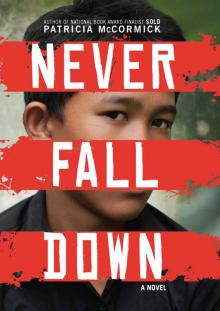 Never Fall Down
Never Fall Down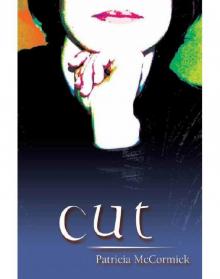 Cut
Cut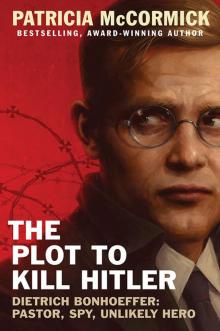 The Plot to Kill Hitler
The Plot to Kill Hitler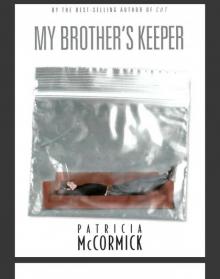 My Brother's Keeper
My Brother's Keeper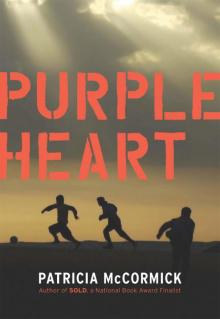 Purple Heart
Purple Heart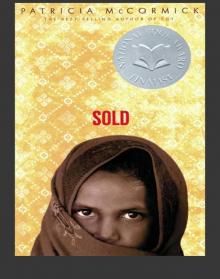 Sold
Sold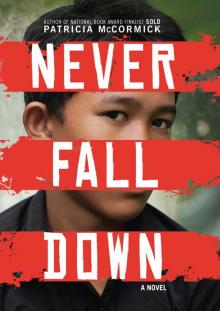 Never Fall Down: A Novel
Never Fall Down: A Novel